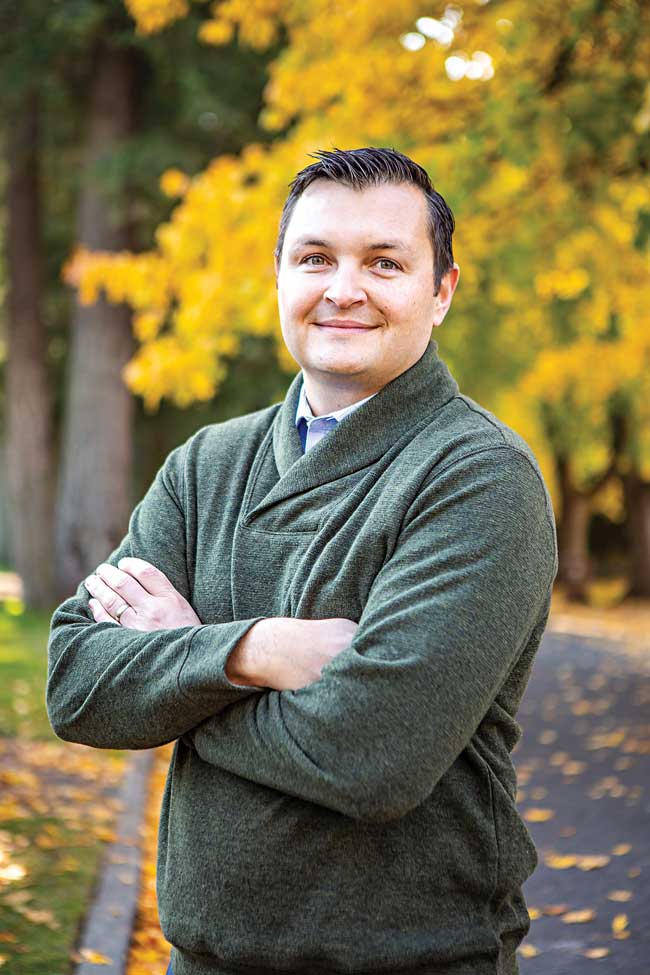Helping businesses and individuals bring new ideas to reality and onto the market is what Johnston Engineering specializes in, and they help design and develop new products in various industries across the market.
Founder Andy Johnston, who has over 18 years of experience in the field explained they can provide services to bring consumer products into mass production for the market, and they can also help design items to help improve the safety standards of certain careers.
Johnston has a Bachelor of Science in Mechanical Engineering from Gonzaga University where he is also an Adjunct Instructor of Mechanical Engineering. Johnston’s wife Natalie is also a mechanical engineer who graduated from Gonzaga, and her family resides near Davenport.
“We have products in the golf industry, we have designed truck bed organizers, items for the boating and rafting industry,” Johnston said. “We have also designed items for the firearms industry including a grip module for company Sig. Then we also have several medical devices we are working on.”
According to the Marketing Coordinator Austin Stone, the company takes a design approach that helps save money with new ideas as well, because they remove the concept of designing multiple prototypes to get a desired result. Instead, they perform a tremendous amount of testing in the drafting and virtual design stage so there is no trial and error through model development.
“Our analysis-driven design makes us a good fit for proving technologies that have never been attempted before,” Stone said via email. “We make them work on the computer before ordering, testing, and breaking parts to make sure components can handle the heat or weight loads, that electronics are packaged and cooled properly over time, that air and water interact in a way we can predict…things like that.”
“So, we have the capabilities to work on some real state-of-the-art projects for renewable energy, aerospace, energy storage, and more,” added Stone.
That means the correct product will be developed the first time around eliminating any wasted resources.
During the design stage they look at the structural analysis to make sure a product will stand up to the physical stresses they are intended for, and then they are analyzed for thermal analysis. Computational Fluid Dynamics is another test certain products are designed for.
One of the current projects they have that is very close to hitting the market as Johnston explains is a medical device that will help load and unload patients from medical helicopters more safely.
“The problem is that we see a lot of obesity in the United States, and heavier individuals also need critical care and air transport,” Johnston said. “But some of the patients weigh up to 575 pounds, and skids and the deck of the helicopters make it difficult to maneuver gurneys close enough to easily load and unload patients.”
“We look to make this procedure safer and easier for the medical staff,” added Johnston. “This will prevent injuries to medical personnel and save money for the companies in the long run as well.”
Getting the company to where it sits now has been a tedious process according to Johnston, but he is very optimistic about where his company is going.
Johnston explained he was previously working for an aerospace company in the gas turbine fuel system division to help in the production of cooling and packaging in military and aerospace applications. When he was with the company they closed the Liberty Lake facility in 2015, and in effect they were moving all employees to Ohio.
This forced Johnston to re-evaluate his situation and wanting to remain in Spokane, he started his own company out of necessity as he described. As he closed out his projects with Parker Aerospace, he remained on staff until October of 2015. He had already started his first independent projects however, so his transition into that was basically seamless.
The company just celebrated a seventh anniversary on August 20, and according to Johnston it took the first six years to really get established.
“Probably the first couple of years I spent about half of my time searching for customers and the other half actually doing the engineering work,” Johnston said. “Getting my name and our services out there took about six years, but now I feel that our machine is really going as we have customers coming to us.”
Johnston continued by explaining the company is starting to expand and will be bringing more employees on while moving into larger facilities to handle their current workload more adequately.
Johnston is confident the growth in the Spokane area and the West Plains will stimulate a need for further services as the area industrially grows. Johnston hopes to get up to 25 employees working out of the facility where they will design, develop, and ship their own products by 2030.
“We are at a crossroads in the Spokane area where a lot of people are moving here because they realized they didn’t want to live in say Seattle or Portland so a lot of money is moving into the area as well, Johnston said. “We are also getting a lot of talented people, many from blue collar backgrounds and I think we will see a big change in the make-up of the population in and around Spokane which will lead us to a point of economic progress we haven’t seen.”
“It is a very unique time for our cities and surrounding communities,” Johnston added. “I think the future is very bright for our area.”

